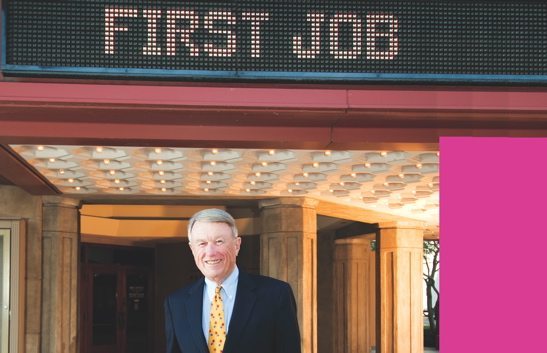John J. Bouma
Chairman
Snell & Wilmer
Describe your very first job and what lessons you learned from it.
My first job was working for my father at the Rialto Theater in Pocahontas, Iowa. It was a very nice, small town theater. I ushered guests, changed the names of the movies on the marquee, switched out movie posters, took tickets, sold tickets, and occasionally ran the projectors. I learned how important it is to be on time, to be courteous and attentive to customers, and to take into consideration people’s individual circumstances. People, and particularly kids, who did not have the ticket price would often get in free.
Describe your first job in your industry and what you learned from it.
My first job in the legal field was as a brand new lawyer at a law firm in Milwaukee. After a few months, I went on active duty as a lieutenant in the Army Judge Advocate General’s Corp (JAG). Through both jobs, I learned the importance of listening and of preparation. I learned to try cases in the Army, first as a defense lawyer, and then as a prosecutor.
What were your salaries at both of these jobs?
During my years at the Rialto Theater my father gave me an allowance. I may have received an additional quarter or two on the nights I changed the marquee or ushered.
The law firm I joined in Milwaukee following college was one of the top-paying firms in the country at that time, paying new associates a yearly salary of $7,800.
Who is your biggest mentor and what role did they play?
My biggest mentor was my father. He had run away from school in the sixth grade, but became a very successful businessman. He encouraged me in sports, throwing or catching baseballs endlessly, encouraged me to go to law school (on the principle that since I argued so much, I should get paid for it), and then encouraged me to settle in Arizona. My father taught me to say what I think, and to stick to my position if I believe I am right.
Mark Wilmer was also an important mentor to me. He was an outstanding trial lawyer and a real gentleman. From working with him and trying cases with him, I learned that being gentle and courteous is not inconsistent with being a great trial lawyer.
What advice would you give to a person just entering your industry?
It is crucial to establish a reputation for absolute honesty and integrity that can never be compromised or subject to question. Beyond that, if you don’t recognize law as a calling –– an opportunity to help people solve problems –– rather than just a way to make a living, you are in the wrong profession.
If you weren’t doing this, what would you be doing instead?
I would be involved with some nonprofit or public enterprise where I could keep my mind active and where my background and experience could be helpful to the organization. I would also devote even more time to a variety of outdoor activities and travel with my wife and family.




